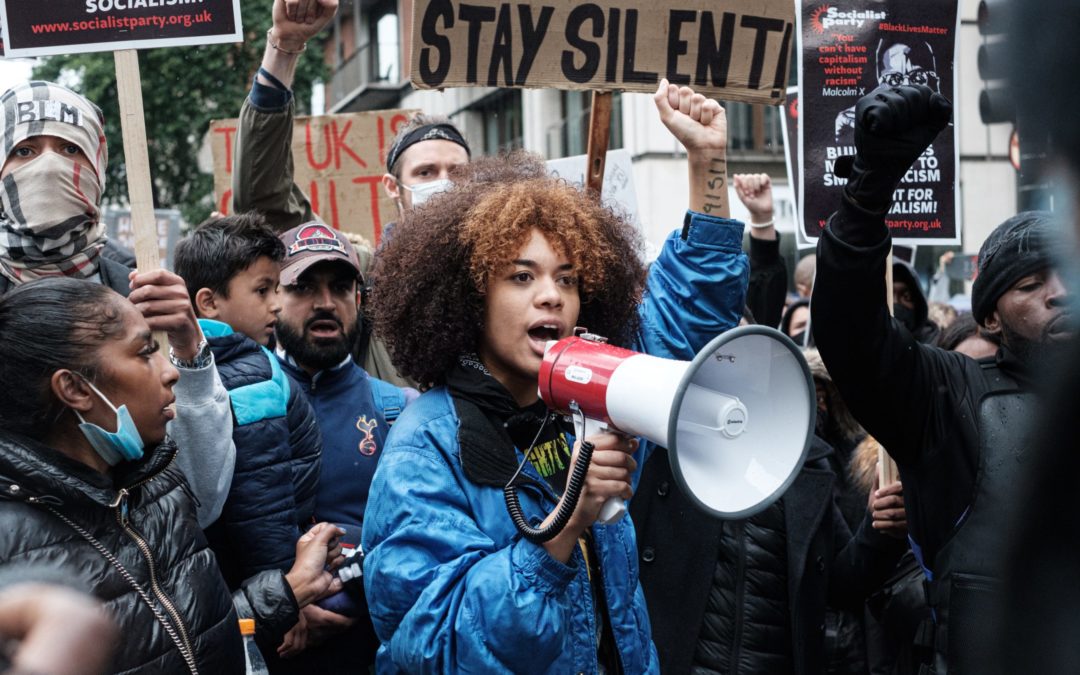
by Jonathan P-Wright | Sep 8, 2023 | Latest, Social Justice |
In a shocking incident that gripped the nation, Jermelle English Jr, a Black man from Wisconsin, faced a wrongful arrest at a local Applebee’s. An unfortunate case of mistaken identity led to this brutal episode, sparking widespread outrage across social media platforms.
The Incident Unfolds
The incident unfolded in July, when law enforcement officers from Kenosha, Wisconsin, barged into an Applebee’s, targeting English Jr. They mistook him for a suspect involved in a hit-and-run accident. A video capturing the scene went viral, showcasing English Jr. pinned to the ground, with his 1-year-old baby nearby, as the officers began hitting him repeatedly1.
Misidentification and Charges
English Jr. and the woman accompanying him, Shanya Boyd, were taken into custody and charged with disorderly conduct and resisting police. Boyd faced an additional charge for marijuana possession. The actual culprits, whom the police were pursuing, were later discovered hiding in the Applebee’s restroom2.
Aftermath and Social Media Uproar
The aftermath of this incident was equally tumultuous. Jennifer Harris, the on-duty manager at Applebee’s at the time, recounted the chaotic scene to CBS 58. She expressed her concern for the baby and English Jr., while also noting that pepper spray was used during the scuffle3.
“It was a lot, I was worried for the baby first off, the baby and the gentleman, that was my first concern,” she said.
Harris also mentioned an employee who tried to intervene, urging the police to stop their assault. However, the cops responded by threatening to arrest him too4.
“One employee was trying to get the cops to stop punching him, he was like, ‘Hey, hey, stop, he’s on the ground, stop,’ and they pushed him, pushed my employee, and said, ‘One more word out of you and you’re arrested.'”
Manager’s Dismissal
In a shocking turn of events, Harris was fired by the restaurant chain after videos of the incident surfaced on social media. The management accused her of tarnishing the Applebee’s brand name.
“They told me they can’t trust me and that I didn’t just ruin this Applebee’s name, I ruined all the Applebee’s in Wisconsin’s name by letting these videos get out,” she stated. “I’m not the one who recorded the videos nor let them out on the internet, so I don’t understand. My employees are trying to get the right story out, so how did we ruin the name of Applebee’s?”
The Power of Social Media and Celebrity Influence
The incident, fueled by social media traction, caught the attention of influential figures, including music mogul JAY-Z. Known for his contributions towards social justice, JAY-Z reportedly helped English Jr. secure a strong legal defense5.
Conclusion
The incident at the Wisconsin Applebee’s serves as a stark reminder of the persistent racial disparities in our society. It underscores the power of social media to highlight social injustices and mobilize support. The episode has spurred a renewed call for police reform and accountability, and the fight for justice continues.

by Jonathan P-Wright | Jul 27, 2023 | Latest, Social Justice |
Photo by Clay Banks on Unsplash
The US Education Department has launched an investigation into Harvard University’s legacy admissions practices following allegations of discrimination. The inquiry was prompted by a complaint filed by a civil rights group, raising concerns about fairness and equity in the admissions process at the prestigious Ivy League institution.
Legacy admissions refer to the practice of giving preferential treatment to the children of alumni during the college admissions process. While legacy preferences have been a longstanding tradition at many universities, they have also faced criticism for perpetuating privilege and reinforcing inequities in higher education.
Harvard University, like other institutions, has faced scrutiny over its legacy admissions policies in recent years. The civil rights group’s complaint brought attention to the potential discrimination against applicants from underrepresented and marginalized backgrounds, who may face barriers in gaining admission compared to legacy applicants.
The US Education Department’s investigation aims to determine whether Harvard’s legacy admissions practices comply with federal laws and uphold principles of equal opportunity. The examination comes in the wake of a recent ruling by the nation’s highest court, which has implications for affirmative action and diversity in college admissions.
In response to the investigation, Harvard University has taken proactive steps to review its admission policies. A spokesperson for the institution emphasized their commitment to fostering an inclusive and diverse student body, and ensuring that doors to opportunity remain open to students from all walks of life.
The scrutiny over legacy admissions reflects broader debates about access and fairness in higher education. Advocates for reform argue that such preferences can perpetuate intergenerational privilege and limit opportunities for students who do not come from legacy backgrounds.
As the investigation unfolds, the nation will closely monitor the US Education Department’s findings and potential recommendations. The outcome of this inquiry could have far-reaching implications for college admissions practices across the country, influencing how universities approach legacy preferences and their efforts to promote diversity and inclusion.
Harvard’s legacy admissions investigation is part of a larger national conversation about the role of universities in addressing structural inequalities in education. Calls for reform and greater transparency in admissions processes have amplified in recent years, urging institutions to adopt more equitable practices that promote access to higher education for all.
While the investigation focuses on Harvard’s specific practices, its outcome may serve as a catalyst for broader discussions about affirmative action, legacy preferences, and the pursuit of a more just and inclusive higher education system in the United States. The Education Department’s efforts to ensure fair admissions practices align with the nation’s ongoing commitment to fostering equal opportunities for all students, regardless of their background or familial connections.
As the inquiry progresses, it will be essential to strike a delicate balance between honoring institutional traditions and embracing progressive reforms that advance social justice in academia. The future of legacy admissions at Harvard and beyond hinges on finding common ground between tradition and transformation in the pursuit of educational excellence and inclusivity.

by Jonathan P-Wright | Jul 17, 2023 | Latest, POLITICS |
Sam Aronov / Shutterstock.com
Esteemed actor and accomplished author Hil Harper has embarked on a momentous political journey by declaring his candidacy for the Democratic nomination for the U.S. Senate in Michigan. Recognized for his remarkable performances on acclaimed television series like “The Good Doctor,” “Limitless,” and “CSI: NY,” Harper is stepping into the realm of politics as a progressive challenger to U.S. Rep. Elissa Slotkin, a frontrunner in the race. This marks Harper’s first foray into public office, bringing his passion and dedication to the forefront of Michigan’s political landscape.
In an interview with The Detroit News, the 57-year-old single father expressed his motivation for entering the Senate race. Harper highlighted the contrasting dynamics between Michigan’s state leadership, which he believes has made significant progress, and the stagnant state of affairs in Washington, D.C. He emphasized the need for energized and bold leadership in the U.S. Senate, recognizing that without it, the state of Michigan would be hindered from reaching its full potential. Harper’s vision is driven by the desire to break free from the shackles of politics as usual and usher in a new era of transformative change.
Harper’s competitor, U.S. Representative Elissa Slotkin, rose to prominence by successfully flipping a seat held by the GOP in 2018. She has consistently showcased her determination as a campaigner and her exceptional skills as a fundraiser. Already campaigning for four months, Slotkin has managed to raise an impressive $5.8 million in her bid for re-election.
Launching his campaign on July 10, Harper outlined his key objectives that align with his progressive stance. His priorities include ending the legislative filibuster, making substantial investments in clean energy and transportation to combat climate change, advocating for universal healthcare coverage, and pushing for an increase in the federal minimum wage to $15 an hour. Harper’s platform reflects his commitment to addressing pressing issues affecting the lives of Michiganders and striving for equitable policies that uplift communities.
As Hil Harper embarks on this political journey, his unique perspective and wealth of experience will undoubtedly contribute to the discourse surrounding Michigan’s future. His background as an accomplished actor and author, combined with his dedication to social justice and progressive values, positions him as a formidable contender in the Senate race. With his passionate pursuit of bold leadership, Harper aims to reshape the political landscape, foster meaningful change, and propel Michigan toward a future of prosperity and equality.

by Jonathan P-Wright | Jul 13, 2023 | POLITICS, Social Justice |
In a historic moment, Yusef Salaam, a member of the Exonerated Five, emerged victorious in the city council primary election in Harlem on June 27. With a resounding victory, Salaam garnered over 50 percent of the democratic vote, securing his place as a potential advocate for the community, according to Rolling Stone.
The momentous occasion was captured in an emotional clip shared by Spectrum News, showcasing Salaam’s heartfelt address to his supporters as the news of his triumph unfolded. Reflecting on his campaign, Salaam revealed to the Associated Press that his focus was centered on improving the lives of those in the community that raised him. His core pillars encompass housing justice, economic advancement, and comprehensive police and law enforcement reform.
Yusef Salaam’s remarkable journey from wrongful conviction to community leader and political contender embodies resilience and the strength of the human spirit. As one of the Exonerated Five, Salaam has faced immense challenges, yet he has emerged as a beacon of hope and an agent for change. With his election to the city council, Salaam aims to channel his experiences and unwavering dedication into tangible actions that uplift the community he calls home.
Salaam’s platform encompasses key issues that directly impact the lives of Harlem residents. Housing justice stands at the forefront, as he strives to address the housing inequalities that have disproportionately affected marginalized communities. Economic advancement takes center stage, aiming to create opportunities and foster economic prosperity for all. Additionally, Salaam emphasizes the pressing need for comprehensive police and law enforcement reform, advocating for a system that is fair, just, and promotes community well-being.
As Yusef Salaam embarks on this new chapter of public service, he embodies the hopes and dreams of his ancestors. His resolute commitment to the betterment of his community, grounded in social justice and empowerment, positions him as a formidable force for change. Salaam’s victory in the city council primary serves as a testament to the power of resilience, unity, and the unwavering pursuit of justice.

by Resultsandnohype | Jul 12, 2023 | Latest, POLITICS, Social Justice |
Harvard University, renowned globally for its esteemed academic standing, is currently under examination for its utilization of legacy admissions procedures. A civil rights group has filed a complaint against the university, alleging that legacy admissions perpetuate discrimination against people of color while providing preferential treatment to predominantly white children of alumni.
According to “The Associated Press”, the complaint filed by civil rights activists raises important questions about equity and fairness in higher education. The organization questions the rationale behind rewarding individuals solely based on the privileges and advantages inherited from prior generations. They argue that such practices hinder the pursuit of a truly diverse and inclusive student body.
The issue of legacy admissions has gained renewed attention in the wake of the Supreme Court’s affirmative action ruling, which has sparked concerns about the future of higher education. With this ruling in mind, the civil rights group is taking action, aiming to address what they perceive as systemic inequalities in college admissions.
Legacy admissions refer to the practice of granting preferential treatment to applicants who have family ties to the university. While supporters argue that legacy preferences foster a sense of community and encourage philanthropy, critics argue that these preferences perpetuate socio-economic disparities and limit opportunities for underrepresented groups.
The civil rights activists contend that legacy admissions at Harvard University disproportionately advantage white students, creating an unlevel playing field for students from marginalized communities. According to their argument, this practice directly challenges the fundamental ideals of meritocracy and equal opportunity that should form the bedrock of the admissions process. They contend that by engaging in such practices, the principles of evaluating individuals based on their abilities and qualifications are compromised, creating a system that unfairly favors certain factors over others. In their view, this departure from merit-based assessment hampers the pursuit of a truly equitable and fair admissions process. Harvard University, known for its commitment to academic excellence, is now faced with addressing the allegations brought forth by the civil rights group.
As the nation grapples with the implications of the Supreme Court’s ruling on affirmative action, the actions taken by this civil rights group shed light on the larger issues surrounding access and fairness in college admissions. Their complaint raises important questions about the role of legacy admissions in perpetuating systemic discrimination and calls for a reevaluation of these practices.
The outcome of this complaint and the ensuing dialogue could have significant implications not only for Harvard University but also for the broader landscape of higher education. It is a pivotal moment for institutions to critically examine their admissions policies and strive for greater equity and inclusivity.
Harvard University’s response to this complaint will undoubtedly shape its future and send a powerful message about its commitment to diversity and social justice. The outcome will reverberate beyond the university’s walls, influencing conversations about admissions practices and the pursuit of equal opportunities in higher education.








RECENT COMMENTS